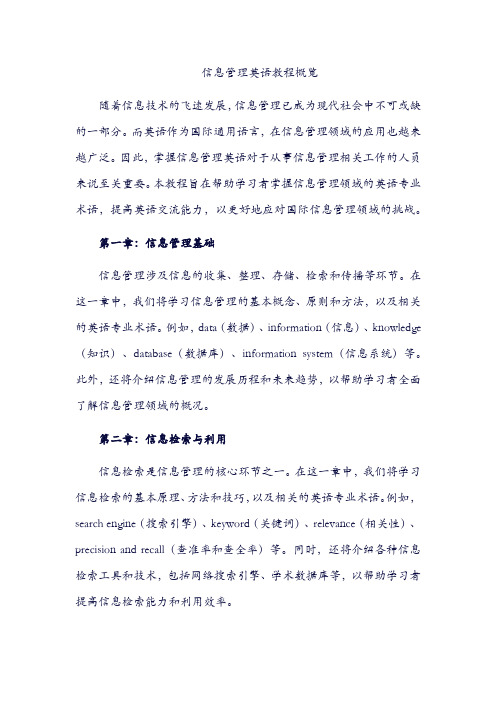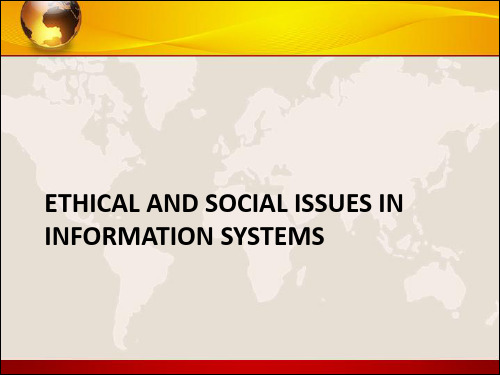信息管理专业英语教程1 .ppt
信管专业英语基础知识(1)

17
专业英语中的词汇来源
来源于英语中的普通词,但被赋予了新的词义。 来源于希腊或拉丁语。 由两个或两个以上的单词组成合成词。 派生词(derivation) 借用词 通过词类转化构成新词 名词化
信息管理专业英语
18
来源于英语中的普通词 但被赋予了新的词义
信息管理专业英语 的基础知识(一)
信息管理专业英语
1
信管专业英语基础知识
专业英语的特点 信管专业英语词汇的构词法分析 信管专业英语资料的阅读与翻译 专业英语中的常用语法知识
信息管理专业英语
2
1.1 专业英语的特点
科技文体是自然科学和技术人员从事专业 活动时使用的一种文体,如科学著作、学 术论文、实验报告、设计报告、科技产品 说明书、科技产品操作指导等都属于科技 文体。科技文体讲究逻辑的条理清楚和叙 述的准确严密,与其它文体有显著的区别
信息管理专业英语
21
有短划线“-”连接的合成词
push +up → push-up 上拉 pull + down → pull-down 下拉 paper + free → paper-free 无纸的 jumper + free → jumper-free 无跳线的 user + centric → user-centric 以用户为中心的 power + plant → power-plant 发电站 conveyer + belt → conveyer-belt 传送带 machine + made → machine-made 机制的 reading + room → reading-room 阅览室
信息管理英语教程pdf

信息管理英语教程概览随着信息技术的飞速发展,信息管理已成为现代社会中不可或缺的一部分。
而英语作为国际通用语言,在信息管理领域的应用也越来越广泛。
因此,掌握信息管理英语对于从事信息管理相关工作的人员来说至关重要。
本教程旨在帮助学习者掌握信息管理领域的英语专业术语,提高英语交流能力,以更好地应对国际信息管理领域的挑战。
第一章:信息管理基础信息管理涉及信息的收集、整理、存储、检索和传播等环节。
在这一章中,我们将学习信息管理的基本概念、原则和方法,以及相关的英语专业术语。
例如,data(数据)、information(信息)、knowledge (知识)、database(数据库)、information system(信息系统)等。
此外,还将介绍信息管理的发展历程和未来趋势,以帮助学习者全面了解信息管理领域的概况。
第二章:信息检索与利用信息检索是信息管理的核心环节之一。
在这一章中,我们将学习信息检索的基本原理、方法和技巧,以及相关的英语专业术语。
例如,search engine(搜索引擎)、keyword(关键词)、relevance(相关性)、precision and recall(查准率和查全率)等。
同时,还将介绍各种信息检索工具和技术,包括网络搜索引擎、学术数据库等,以帮助学习者提高信息检索能力和利用效率。
第三章:信息安全与保护信息安全是信息管理领域的重要议题。
在这一章中,我们将学习信息安全的基本概念、原则和方法,以及相关的英语专业术语。
例如,cybersecurity(网络安全)、encryption(加密)、firewall(防火墙)、malware(恶意软件)等。
此外,还将介绍信息安全管理的策略、技术和工具,以帮助学习者了解如何保护信息安全、防范网络攻击和数据泄露等风险。
第四章:信息系统开发与管理信息系统是信息管理的基础设施。
在这一章中,我们将学习信息系统开发与管理的基本原理、方法和过程,以及相关的英语专业术语。
信息管理专业英语16学时第一课精品PPT课件

硬件
– software
软件
– middleware 中间件、中间设备
– groupware – peopleware
组件、群件 人件
next
The Definition of Middleware Middleware serves to ‘glue
together’ or mediate between two separate and often already existing programs.
语法的特点 ❖客观(objectivity) ❖精练(conciseness) ❖准确(accuracy)
客观(objectivity)
❖因为要求客观,所以常用被动语态和一 般现在时。有人统计专业英语中被动语 态的句子要占1/3至1/2。
精练(conciseness)
❖因为要求精练,专业英语中常希望用尽 可能少的单词来清晰地表达原意。这就 导致了名词化单词或词组及其他简化形 式的广泛使用。
时态的特点
❖至于一般过去时、一般完成时也在专业 英语中经常出现,如科技报告、科技新 闻、科技史料等。
读、写 ❖词 ❖句 ❖段
词汇 ❖普通词被赋予新的词义 ❖派生词 ❖合成词 ❖借用词 ❖通过词类转化构成新词 ❖名词化
派生词(derivation)
这类词汇根据已有的词加上某种前 后缀,或以词根生成、或以构词成分形 成新的词。科技英语词汇中有很大一部 分来源于拉丁语、希腊语等外来语,有 的是直接借用,有的是在它们之上不断 创造出新的词汇。这些词汇的构词成分 (前、后缀、词根等)较固定,构成新词 以后便于揣度词义,易于记忆。
次技术词汇(sub-technical words)
❖次技术词汇是指不受上下文限制的各专 业中出现频率都很高的词。这类词往往 在不同的专业中具有不同的含义
信息管理系统英文课件 (1)

overnight to these ripples—it may take years to develop etiquette, expectations, laws
• Requires understanding of ethics to make choices in legally gray areas
– Due process:
• Laws are well known and understood, with an ability to appeal to higher authorities
people • Invasion of privacy • Lack of personal care
3
CHAPTER 4: ETHICAL AND SOCIAL ISSUES IN INFORMATION SYSTEMS
Understanding Ethical and Social Issues Related to Systems
Understanding Ethical and Social Issues Related to Systems
• Key technology trends that raise ethical issues
1. Doubling of computer power
• More organizations depend on computer systems for critical operations
管理学专业英语教程(精编版)(第二版)课件Unit 1 Modern management move

Contingency Approach
Three Principle Sets
Agreement exists between organizations and their internal and external environments, and between the management system and its various components.
FudaLnOGO
Process Approach
Process approach proposed by Fayol
Defining goals establishing strategy, and developing plans to coordinate activities
Planning
Modern Management Movement
管理学专业英语教程(精编版) (第二版)
Fudan University
LOGO
Outlines ——approaches to modern management
1
Process approach
2
System approach
3
Contingency approach
❖ “system”
connected parts joined to form a whole in which the coordinated and combined effect of the subsystems creates synergy
Internal behavior
people inside organizations perform their individual and group tasks
信息管理专业英语unit 1 Reading Material

Data(数据), Information(信息), Knowledge, and Wisdom(智慧) There is probably(可能) no segment(项) of activity in the world attracting(吸引) as much attention(注意) at present as that of knowledge management(管理). Yet as I entered this arena(领域) of activity I quickly found there didn't seem to be a wealth(丰富) of sources that seemed to make sense in terms of defining(定义) what knowledge actually was, and how was it differentiated(区别) from data, information, and wisdom. What follows is the current level(水平) of understanding I have been able to piece together(拼凑) regarding data, information, knowledge, and wisdom. I figured(认为) to understand one of them I had to understand all of them.According to Russell Ackoff, a systems theorist(理论家) and professor of organizational(组织的) change, the content(内容) of the human mind(意识) can be classified(分类) into five categories(范畴):Data: symbols(符号)Information: data that are processed(处理) to be useful; provides answers to "who", "what", "where", and "when" questionsKnowledge: application(应用) of data and information; answers "how" questionsUnderstanding(理解): appreciation(评价) of "why"Wisdom: evaluated(有价值的) understanding.Ackoff indicates(指出) that the first four categories relate(联系) to the past; they deal(处理) with what has been or what is known. Only the fifth category, wisdom, deals with the future because it incorporates(结合) vision(想象力) and design(设计). With wisdom, people can create the future rather than just grasp(掌握) the present and past. But achieving(达到) wisdom isn't easy; people must move successively through the other categories.A further elaboration(阐述) of Ackoff's definitions(定义) follows:Data... data is raw(未加工的). It simply exists(存在) and has no significance(重要性) beyond its existence (in and of itself). It can exist in any form(形态), usable or not. It does not have meaning(含义) of itself. In computer parlance(用法), a spreadsheet(电子数据表) generally(一般地) starts out by holding(含有) data. Information... information is data that has been given meaning by way of relational(相关的) connection(连接). This "meaning" can be useful, but does not have to be. In computer parlance, a relational database(数据库) makes informationfrom the data stored within it.Knowledge... knowledge is the appropriate(适当的) collection(组) of information, such that it's intent(目的) is to be useful. Knowledge is a deterministic(确定性的) process(过程). When someone "memorizes"(记忆) information (as less-aspiring(消极的) test-bound(被考试束缚的) students often do), then they have amassed(积聚) knowledge. This knowledge has useful meaning to them, but it does not provide for, in and of itself, an integration(整合) such as would infer(推导) further(更多的) knowledge. For example, elementary school(小学) children memorize, or amass knowledge of, the "times table"(乘法表). They can tell you that "2 x 2 = 4" because they have amassed that knowledge (it being included(包含) in the times table). But when asked what is "1267 x 300", they can not respond(回答) correctly because that entry(内容) is not in their times table. To correctly answer such a question requires(需要) a true cognitive(认知的) and analytical(分析的) ability that is only encompassed(包含) in the next level... understanding. In computer parlance, most of the applications(应用) we use (modeling(建模), simulation(模拟), etc.) exercise(使用) some type of stored knowledge.Understanding... understanding is an interpolative(添加的) and probabilistic(或然的) process. It is cognitive and analytical. It is the process by which I can take knowledge and synthesize(合成) new knowledge from the previously(以前) held(持有的) knowledge. The difference between understanding and knowledge is the difference between "learning" and "memorizing". People who have understanding can undertake(担任) useful actions(行动) because they can synthesize new knowledge, or in some cases(情形), at least new information, from what is previously known (and understood). That is, understanding can build upon currently(当前) held information, knowledge and understanding itself. In computer parlance, AI(人工智能) systems possess(拥有) understanding in the sense(意义) that they are able to synthesize new knowledge from previously stored information and knowledge. Wisdom... wisdom is an extrapolative() and non-deterministic(非确定的), non-probabilistic(非或然的) process. It calls(调用) upon all the previous levels of consciousness(意识), and specifically(特别地) upon special types of human programming() (moral(道德的), ethical(伦理的) codes(代码), etc.). It beckons to(示意) give us understanding about which there has previously(以前) been no understanding, and in doing so, goes far beyond understanding itself. It is the essence(本质) of philosophical(哲学的) probing(探索). Unlike the previous four levels, it asks questions to which there is no (easily-achievable) answer, and in some cases, to which there can be no humanly-known answer period(时期). Wisdom is therefore(因此), the process by which we also discern(辨别), or judge(判断), between right and wrong, good and bad. I personally believe that computers do not have, and will never have the ability to posses(拥有) wisdom. Wisdom is a uniquely(独特地) human state, or as I see it, wisdom requires one to have a soul(心灵), for it resides(存在) as much in the heart as in the mind. And a soul is somethingmachines will never possess (or perhaps I should reword(改写) that to say, a soul is something that, in general, will never possess a machine).Personally I contend(主张) that the sequence(序列) is a bit less involved(涉及) than described(描述) by Ackoff. The following diagram(图表) represents(表现) the transitions(变化) from data, to information, to knowledge, and finally to wisdom, and it is understanding that support the transition from each stage(等级) to the next. Understanding is not a separate(独立的) level of its own.Data represents a fact or statement(陈述) of event(事件) without relation to other things.Ex: It is raining.Information embodies(包含) the understanding of a relationship of some sort, possibly cause(原因) and effect(结果).Ex: The temperature(温度) dropped(下降) 15 degrees(度) and then it started raining.Knowledge represents a pattern(模式) that connects and generally(一般地) provides a high level of predictability(预言) as to what is described or what will happen(发生) next.Ex: If the humidity(湿度) is very high and the temperature drops substantially(充分地) the atmospheres(大气) is often unlikely to be able to hold the moisture(湿气) so it rains.Wisdom embodies more of an understanding of fundamental(基本) principles(原理) embodied within the knowledge that are essentially(本质上) the basis for the knowledge being what it is. Wisdom is essentially systemic(系统化的).Ex: It rains because it rains. And this encompasses(包含) an understanding of all the interactions(相互作用) that happen between raining, evaporation(蒸发), air currents(流通), temperature gradients(梯度), changes, and raining.Yet, there is still a question regarding(关于) when is a pattern knowledge and when is it noise(垃圾数据). Consider the following:Abugt dbesbt regtc uatn s uitrzt.ubtxte pstye ysote anet sser extessibxtedstes bet3 ibtes otesb tapbesct ehractsIt is quite likely this sequence represents 100% novelty(新奇), which means it's equivalent(等于) to noise. There is no foundation(基础) for you to connect with the pattern(模式), yet to me the statements are quite meaningful as I understand the translation with reveals(显露) they are in fact Newton's 3 laws of motion. Is something knowledge if you can't understand it?Now consider the following:I have a box.The box is 3' wide, 3' deep, and 6' high.The box is very heavy.The box has a door on the front of it.When I open the box it has food in it.It is colder inside the box than it is outside.You usually find the box in the kitchen(厨房).There is a smaller compartment(分隔) inside the box with ice in it.When you open the door the light comes on.When you move this box you usually find lots of dirt(灰尘) underneath(在...下面) it. Junk(垃圾) has a real habit of collecting on top of this box.What is it?A refrigerator(冰箱). You knew that, right? At some point in the sequence you connected with the pattern and understood it was a description of a refrigerator. From that point on each statement only added confirmation(确认) to your understanding.If you lived in a society that had never seen a refrigerator you might still be scratching(搔) your head as to what the sequence of statements referred(针对) to. Also, realize(认识到) that I could have provided you with the above statements in any order and still at some point the pattern would have connected. When the pattern connected the sequence of statements represented knowledge to you. To me all the statements convey(传达) nothing as they are simply 100% confirmation ofwhat I already knew as I knew what I was describing(描述) even before I started.译文:数据,信息,知识,和智慧目前,世界上可能有不断的活动吸引尽可能多的注意力去关注知识管理。
管理信息系统精要版最新版英文教学课件第1章
Business Information Systems
in Your Career
Essentials of Management Information Systems
Chapter 1 Business Information Systems in Your Career
STUDENT LEARNING OBJECTIVES
Essentials of Management Information Systems
Chapter 1 Business Information Systems in Your Career
The Role of Information Systems in Business Today
Interactive Session: People Meet the New Mobile Workers • Read the Interactive Session and then discuss the following questions:
Essentials of Management Information Systems
Chapter 1 Business Information Systems in Your Career
THE SF GIANTS WIN BIG WITH INFORMATION TECHNOLOGY
• San Franciso Giansts/AT&T Stadium uses Fieldf/x to improve team decision making, Qcue to provide dynamic ticket pricing, and wireless technology to provide services for fans.
《管理信息技术》ppt课件(英文版)—
Benefits and Costs - Other measures
Distinguishing between investments in infrastructure and investments in specific applications will assist the analysis. IT infrastructure, provides the foundations for IT applications in the enterprise (data center, networks, date warehouse, and knowledge base) and are long-term investments shared by many applications throughout the enterprise. IT applications, are specific systems and programs for achieving certain (payroll, inventory control, order taking) objectives and can be shared by several departments, which makes evaluation of their costs and benefits complex.
present value of the future benefits to the cost required to achieve
those benefits.
•
Return on investment ( ROI) measures the effectiveness of
管理信息系统双语课件
管理信息系统双语——总复习 Systems from a Constituency Perspective: ★ ★ ★
Transaction Processing Systems(TPS), Management Information Systems(MIS),
管 理 信 息 系 统
Decision-Support Systems(DSS), Executive Support Systems(ESS)
4. Types of Business Information Systems
Systems for Functional Perspective: Sales and Marketing Systems, Manufacturing and Production Systems, Finance and Accounting Systems, Human Resources Systems
5. Enterprise Applications: ★ ★ ★ ★ ★
Enterprise Systems Supply Chain Management Systems Customer Relationship Management Systems Knowledge Management Systems
13
管理信息系统双语——总复习 7. push-based model, pull-based model ★ ★ 8. Supply chain planning systems, supply chain execution 管 理 信 息 系 统 systems ★ ★ 9. CRM Systems capture and integrate customer data from all over the organization, consolidate the data, analyze the data, and then distribute the results to various systems and customer touch points across the enterprise. 10. cross-selling, up-selling, bundling ★ ★ 11. churn rate★ ★
信息管理与信息系统专业英语ch1ch4 PPT课件
• involve verb
• 1 if an activity or situation involves something, that thing is part of it or a result of it:
• 这个工作包含些什么? • 我没有意识到排练一个话剧需要这么多
工作。 • 尽可能让更多的孩子参与到游戏中来
Tactical Information Systems Strategic Information Systemrcises Ch1-Ch4
Words & expressions
• Involve • Process • Account, account for • Occur • Adjust • Pack, package • Validate • Identify
validate
• formal to prove that something is true or correct, or to make a document or agreement officially and legally acceptable [= confirm]:
• 许多科学家都计划等待直到研究结果被 将来的研究所证实
•
possibility
•
predictability
• -tive …的
• Objective • Descriptive • Competitive • Comparative • Distinctive • repetitive
Macro-宏观的 macroeconomics
• -based基于,以……为基础 • Computer-based • rate-based 基于速率的 • credit-based 基于信誉的 • file-based 基于文件的 • event-based 基于事件的
- 1、下载文档前请自行甄别文档内容的完整性,平台不提供额外的编辑、内容补充、找答案等附加服务。
- 2、"仅部分预览"的文档,不可在线预览部分如存在完整性等问题,可反馈申请退款(可完整预览的文档不适用该条件!)。
- 3、如文档侵犯您的权益,请联系客服反馈,我们会尽快为您处理(人工客服工作时间:9:00-18:30)。
信息高速公路 与某人通信 通过;批准 参加,加入 商业服务提供商 坚持;遵守;粘附;追随 在幼年时代;在初期 由…组成 万一...的话;如果是...的话 参与,分享,分担
take charge of be known as in the making even though think of carry out in turn interact with lie in
share
[FZE]
n.&v.分享
adhere
[Ed5hiE]
v.坚持
function [5fQNkFEn]
n.功能,作用
archive [5B:kaivz]
n.档案,公文
thrive
[Wraiv]
v.兴旺,繁荣,茁壮成长,旺盛
New Words
display retrieve infancy conceive defense protect event strike channel project spread
n.争论,辩论v.争论,辩论
isolated [5aisEleitid] adj.隔离的,孤立的,单独
burgeon [5b\:dVEn]
n.嫩芽v.萌芽
frontier [5frQntjE]
n.国境,边疆,边境
New Words
supplement [5sQplimEnt] v.补充n.补充,附录
[di5splei] vt.显示
[ri5tri:v]
v.检索,重新得到
[5infEnsi] n.幼年;初期
[kEn5si:v]
vt.&vi构思;构想;设想
[di5fens] n.防卫,防卫物vt.抵御;谋划
[prE5tekt]
vt.保护
[i5vent]
n.事件
[straik]
n.打击
[5tFAnl]
n.元网络
span
[spAn]
vt.横越,跨越n.跨度,跨距,范围
exact
[i^5zAkt] adj.精确的,准确的
respectively [ri5spektivli] adv.分别地,各个地
standardize [5stAndEdaiz] vt.使标准化,使与标准一致
protocol [5prEutEkCl] n.协议
n.模型,原型vt.模仿v.模拟
[5speFElaiz] vi.专攻,专门研究,使专用于
Phrases
information superhighway correspond with… go through join in commercial service provider adhere to in one’s infancy be made up of in the event of participate in
commercial [kE5mE:FEl] adj.商业的,贸易的
agency [5eidVEnsi]
n.代理处,行销处,代理,中介
individual [indi5vidjJEl] adj.单独的,特殊的,个别的
predominant [pri5dCminEnt][5prCdVekt] n.项目,计划,方案,工程
[spred]
n.伸展,展开
New Words
cooperate [kEu5CpEreit] vi.合作,协作
established [is5tAbliFt]
adj.已制定的,确定的
investigate [in5vesti^eit] v.调查,研究
traditional [trE5diFEnEl] adj.传统的,惯例的
gather
[5^ATE]
n.&v.集合,聚集
skillfully [5skilfuli]
adv.巧妙地,技术好地
facility [fE5siliti]
n.设备,工具,容易,简易
shrink
[FriNk]
v.收缩,缩短
expertise [ekspE:5ti:z] n.专门技能,专门知识
New Words
process send handle advantage model specialize
[prE5ses] n.过程,方法,程序,步骤vt.加工,处理
[send]
vt.送,寄,发送
[5hAndl] vt.处理,操作n.句柄
[Ed5vB:ntidV] n.优势,有利条件,利益
[5mCdl]
advancement [Ed5vB:nsmEnt] n.前进,进步,提升
popular 的
[5pCpjulE]
adj.通俗的,流行的,受欢迎
browse [brauz]
v.&n.浏览
library
[5laibrEri] n.库
colleague [5kCli:^]
n.同事,同僚
debate
[di5beit]
institution [7insti5tju:FEn] 度
n.公共机构,协会,制
local
[5lEukEl] adj.地方的,当地的,局部的
regional [5ri:dVEnEl] adj.整个地区的,地方的,地 域性的
New Words
unique
[ju:5ni:k]
adj.唯一的,独特的
detail
司爱侠 侯安才 张强华 黄祝菲 编著
信息管理专业英语教程
人民邮电出版社
Unit 4 Internet Introduction
退出
New Words
economic [7i:kE5nCmik] adj.经济(上)的,经济学的
political [pE5litikEl] adj.政治的,行政上的
financial [fai5nAnFEl] adj.财政的,金融的
imaginable [i5mAdVinEbl] adj.可想象的,可能的
resource [ri5sC:s]
n.资源
indirect [7indi5rekt] adj.间接的,迂回的
link
[liNk]
n.链接
New Words
option
[5CpFEn] n.选项,选择权
metanetwork [5metEnetwE:k]
[5di:teil]
n.细节,详情
effectively [i5fektivli] adv.有效地,有力地
client
[5klaiEnt]
n.客户
request [ri5kwest] vt.&n.请求,要求
session [5seFEn]
n.对话期
download [daunlEud]
v.下载
cooperation [kEu7CpE5reiFEn]n.合作,协作
